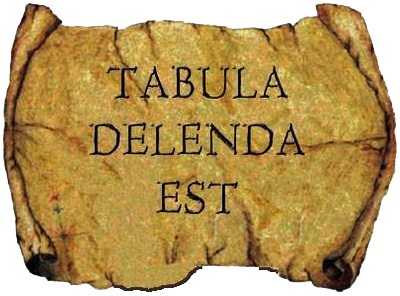 A while back I told you that in England some priests have started a new Confraternity of Catholic Clergy. They want a Confraternity which is faithful to Catholic doctrine and their identity as Catholic priests. I know quite a few of these men and they are great priests.
A while back I told you that in England some priests have started a new Confraternity of Catholic Clergy. They want a Confraternity which is faithful to Catholic doctrine and their identity as Catholic priests. I know quite a few of these men and they are great priests.
Therefore, it was simply a matter of waiting a few days before this fine initiative was attacked in The Tablet (aka The Bitter Pill aka RU 486 aka FishnChipsWrap).
Here is a letter accepted by RU for your disedification in the 9 April number. My emphases and comments:
Dubious models of priesthood?
It was interesting to read about the new Confraternity of Catholic Clergy in the British Province of Pope St Gregory the Great (News from Britain and Ireland, 2 April). The theologically dubious description of the priest as being an image of Christ, acting in the person of Christ, and possessing an “active instrumental power” all in a way in which the layman respectively is not, cannot, and does not, betrays a clericalist and power-based notion of priesthood at odds with any notion of service. [I am not sure from which planet the writer came, but on my planet the Catholic Church teaches these very things about the difference between priests and lay lay people.] This could all be put down to a traditionalist nostalgia for past priestly status or to an outmoded and flawed theology of the priesthood, were it not for the fact that psychologists and others are very aware that it is precisely that kind of power-focused selfdefinition that has in part contributed to the abuse of power within the priesthood, including the sexual abuse of children. [Nasty business, this. Affirm that there is a difference between the priesthood of the laity and the priesthood of the ordained and you on the same course as a child abuser. Tell that to the feminist nuns who abused kids.]
John J. Dunne
Bridge of Earn, Perth
 Okay… take a moment to … I don’t know… perhaps to wash your face after that slimy green-ink diatribe.
Okay… take a moment to … I don’t know… perhaps to wash your face after that slimy green-ink diatribe.
I don’t think any Catholic publication, even one such as The Tablet, should print a letter like that. Shame on the editor.
And to the writer:
I, a priest, can consecrate the Eucharist and absolve sins, and even confirm if necessary. If you are a lay person, you can’t. Even if you are a deacon, you can’t.
I, a priest, act in the person of Christ when I consecrate or absolve or forgive your sins during sacramental confession. I, a priest, am alter Christus when I do those things in a way that you, a lay person or even a deacon, cannot be. I, a priest, when I do those things, do them by Christ’s power through my poor and unworthy person.
I, a priest, can hold certain offices in the Church, which you, if you are a lay person, can’t.
I, a priest, am not better than you, if you are a lay person, but I have received a sacrament which made a change to my soul. I am different. I will be a priest in that sense forever, even after death, in heaven or in hell (God forbid).
If you are a lay person, you share in the priesthood of Christ insofar as you are baptized, but you are not a priest in the sense that I am a priest.
That’s how it is in my Church. The Catholic Church.
I hope the English Confraternity grows in numbers quickly. Let it be attacked often in the pages of The Pill.
Lay people can join as “friends” of the Confraternity.
Also, the Confraternity is going to be able to take donations through a PayPal button on their website. I hope many of the readers, in honor of The Tablet will go mobilize in support of these good men and make a donation…
… and then write a letter to the editor of The Tablet saying how much you gave and why.


































The evil one is so predicatable in his attacks:
1) attack authority;
2) attack tradition;
3) belittle your opponent
3) assert the importance of me
That’s the way it started in the Garden of Eden, and he hasn’t varied one iota since then.
Sorry for not being able to count (1,2,3,3) ;(
Setting aside the “spirit” of Vatican II and actually looking at the letter, our correspondent to The Bitter Pill might read the following in Lumen Gentium 10: “Though they differ from one another in essence and not only in degree, the common priesthood of the faithful and the ministerial or hierarchical priesthood are nonetheless interrelated: each of them in its own special way is a participation in the one priesthood of Christ. The ministerial priest, by the sacred power he enjoys, teaches and rules the priestly people; acting in the person of Christ, he makes present the Eucharistic sacrifice, and offers it to God in the name of all the people. But the faithful, in virtue of their royal priesthood, join in the offering of the Eucharist. They likewise exercise that priesthood in receiving the sacraments, in prayer and thanksgiving, in the witness of a holy life, and by self-denial and active charity.”
They think the priesthood, i.e., “Big Bad Clericalism,” is a model for power. They must’ve skipped Patristics and Conciliar Teachings.
It is a model for service and sacrifice. They, not the Confraternity, Do. Not. Get. It. They are the ones lusting for power, not the Confraternity.
If priests and laypeople were exactly the same in their powers and callings and sacraments, I’d just stay home on Sunday and say Mass my own self, possibly in my sacramental jammies; and Father Z would have a W-2 and a company job, instead of weird Byzantine tax regulations for clergymen. The Church is not an undifferentiated mass of generic protoplasm. We are One Body of Christ, composed of many parts which have different functions. To say otherwise is not just clericalism, but an attempt at identity theft.
St. Bernard–referring to the priest’s power to offer sacrifice and his power to forgive sins–wrote
God has exalted you above kings and emperors. He has elevated your rank above all other ranks. He has raised you above angels and archangels, above the denominations and powers, and all the angelic hosts of heaven. Powers have been given you that have not been given to any king or emperor, not given to angels or archangels; powers have been given to you that have not been given even to the Blessed Mother of God Himself!”
Evidently this is not precisely how the letter’s author views the priesthood. Indeed, he might even consider these particular powers (of sacrifice and of absolution) to be “at odds with any notion of service”. In which case, I wonder what particular “service” he thinks the priest is ordained to provide.
To be sure, the distinction between the universal priesthood and the hierarchical priesthood is something essential and not just a matter of degree, and it has to be maintained in a proper way. (Enc. Mysterium Fidei, Pope Paul VI)
The sad thing in this is that there is a need to create an organization of priests that “is faithful to Catholic doctrine and their identity as Catholic priests”. Shouldn’t this be an obvious requirement of every priest?
(No need to answer, I understand why but am just disappointed things are this bad…)
@Brooklyn: NOBODY EXPECTS THE SPANISH INQUISITION!
Sorry, couldn’t resist.
From Father: “If you are a lay person, you can’t. Even if you are a deacon, you can’t.” Just in case anyone passing by doesn’t know (I know, I know, who reads Fr. Z who doesn’t already get this stuff?), that’s, “Even if you are [not a lay person but] a deacon, you can’t.”
I concurr with George, by the way. Important that this be done, but sad that it had to be.
Perhaps we should all become Quakers. You get to meet each week without the hassle of an ordained priest. Everyone sits in a circle and if you’re lucky, you might get to sing.
I don’t have a problem with Quakers. Many of them are very fine people. It just so happens that I’m not a Quaker because some of their beliefs aren’t Catholic, and mine are.
P.S. I do like that hymn, Dear Lord and Father of Mankind.
You tell ’em, Father Z! (and that’s all I’m gonna say)
‘Tabula delenda est’, indeed!
May the Confraternity of Catholic Clergy flourish in England and Wales!
The writer’s comment that the role of the priest as distinct from the laity was a flawed theological mode leading to abuse is unsupported by what has been learned from the actual sudies of the problem. Not only did the incidents of abuse spike dramatically as the traditional distinction between clerics and the laity began to erode from the late 60’s – and continued at an comparatively elevated level through the mid-80’s – but what has been learned from many of the individual instances of abuse suggests that it was the erosion of the restrictions inherent in that traditional model that at least facilitated such incidents and probably served as a causative factor. Many of those identified as abusers were ones who went out of their way to be ‘one of the guys’, and a virtual ‘member of the family’ rather than maintaining the traditional distance in status. The claim that these incidents came about as an assertion of power by the abuser is supported more by the ideological pre-disposition of the claimant than by the actual facts.
The American Confraternity of Catholic Clergy and the Australian CCC are in full solidarity with our British, Scottish and Irish confreres (United Kingdom CCC) over the Atlantic. While the animosity here is not as vituperative as in UK, nevertheless, we get slandered, libeled, attacked, maligned and mistreated not just by some in the secular press, but also some alleged ‘Catholic’ media here in the USA. The CCC exists to foster ongoing theological, spiritual & pastoral formation of it’s members in a fraternal environment under the protection of Our Lady Queen of the Clergy and in full and total obedience to the Roman Pontiff. http://www.catholic-clergy.org